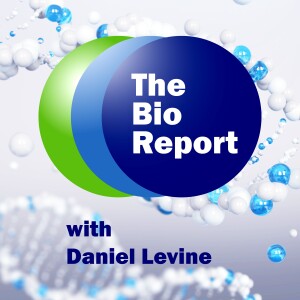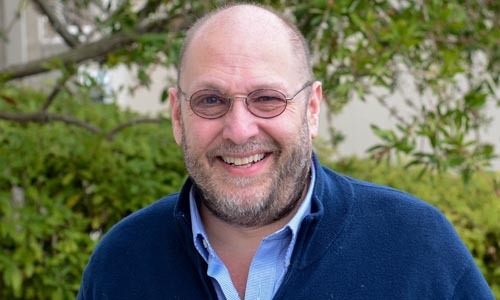Episodes

Wednesday May 07, 2025
A Bet that Myostatins Can Muscle Out Obesity
Wednesday May 07, 2025
Wednesday May 07, 2025
GLP-1 agonists have been a breakthrough for the treatment of obesity, a global problem with serious health risks. While the benefits of these therapies are seen as outweighing the risks, there have been some concerns about the loss of muscle mass, particularly in older people using these drugs. iBio is developing next-generation obesity therapies that may be able to be used in combination with GLP-1 agonists or by themselves. Its lead experimental therapy is a myostatin inhibitor, part of a class of therapies that have been of interest to treat muscle wasting. We spoke to Martin Brenner, CEO and chief scientific officer of iBIO, about obesity, the limits of GLP-1 agonists, and the potential for myostatin inhibitors alone or in combination with GLP-1 agonists.

Wednesday Apr 30, 2025
Making Whole-Eye Transplantation a Reality
Wednesday Apr 30, 2025
Wednesday Apr 30, 2025
At the end of 2024, the Advanced Research Projects Agency for Health awarded a team led by the University of Colorado Anschutz Medical Campus, and including the Foundation Fighting Blindness and six other research groups, up to $46 million to advance research to enable human eye transplants to restore vision in people who are blind. The goal of the project is to make whole eye transplantation a reality by 2030. We spoke to Kia Washington, the project’s principal investigator and professor of surgery at the University of Colorado School of Medicine; and Chad Jackson, senior director of preclinical translational research at the Foundation Fighting Blindness about why no one has been able to restore vision through whole eye transplantation yet, the technological advancements that now put the goal in reach, and why maintaining and restoring the optic nerve remains a central challenge.

Wednesday Apr 23, 2025
Synbio Companies Come to Grips with the One “Omic” that Matters
Wednesday Apr 23, 2025
Wednesday Apr 23, 2025
Synthetic biology companies have faced a difficult few years as share prices have been battered and investment in the sector has waned. As investors and companies are readying to gather for the annual SynBioBeta conference in San Jose May 5 through 8, a new report from the bipartisan National Security Commission on Emerging Biotechnology warns that the United States is at risk of losing its leadership to China and is calling for a $15 billion investment into biotech over the next five years to support startups that strengthen national security. We spoke to John Cumbers, founder and CEO of SynBioBeta, about the state of synthetic biology, the policy landscape, and the upcoming SynBioBeta 2025 conference. (Listeners of The Bio Report wishing to attend SynBioBeta can use the discount code “thebioreport” to save on their registration at synbiobeta.com.)

Wednesday Apr 16, 2025
Searching for Safer Pain Medications
Wednesday Apr 16, 2025
Wednesday Apr 16, 2025
Until recently, treatments for both chronic and acute pain had been an area that went for decades without the development of innovative new treatments. South Rampart Pharma is seeking to develop safer and more effective pain management therapies that avoid the liver toxicity of acetaminophen, the kidney toxicity of NSAIDs, and the abuse potential of opioids. We spoke to Hernan Bazan, co-founder and CEO of South Rampart Pharma, about the need for new pain medicines, the company’s first-in-class experimental analgesic, and how it avoids the problems common with other pain medications.

Wednesday Apr 09, 2025
Bridging the Translational Divide in Healthcare AI
Wednesday Apr 09, 2025
Wednesday Apr 09, 2025
The Zimin Institute for AI Solutions in Healthcare, a joint initiative between the Zimin Foundation and the Technion – Israel Institute of Technology, is seeking to accelerate the integration of AI into the life sciences. Although it is pursuing a wide range of opportunities from precision medicine to therapeutic discovery, its primary focus is on addressing real-world problems and conducting translational research. We spoke to Shai Shen-Orr, director of the Zimin Institute for AI Solutions, about the challenges the institute seeks to address, how it operates, and how it aims to bridge the gap between academic research and commercial applications in healthcare AI.

Wednesday Apr 02, 2025
Seeking Long-Term Pain Relief from a Drug-Free Injection
Wednesday Apr 02, 2025
Wednesday Apr 02, 2025
The search for non-opioid pain relievers opioids has focused on pharmaceutical alternatives including non-steroidal anti-inflammatories, antidepressants, and anticonvulsants. Brixton Biosciences is developing Neural Ice, an injectable frozen slurry that can degenerate nerves in targeted areas and provide pain relief for extended periods. The discovery capitalizes on unexpected findings about the effects of a fat-reducing cosmetic procedure. We spoke to Sameer Sabir, co-founder and CEO of Brixton Biosciences, about the unmet need for pain management, how Neural Ice works, and the company’s initial focus on osteoarthritis and post-operative knee pain.

Wednesday Mar 26, 2025
Engaging Hard-to-Target Receptors with Antibodies that Activate
Wednesday Mar 26, 2025
Wednesday Mar 26, 2025
Antibodies have been powerful tools for inhibiting a targeted protein. Abalone Bio is pursuing a new class of antibody therapies called activating antibodies that can regulate cellular processes and restore their balance. One aspect that makes these rare antibodies attractive is that they can target previously undruggable G protein-coupled receptors, allowing them to treat diseases that have been hard to address. We spoke to Richard Yu, co-founder and CEO of Abalone Bio, about activating antibodies, how the company generates massive data sets for its AI-driven platform technology, and how it looks beyond binding to explore the function of these antibodies.

Wednesday Mar 19, 2025
An Insider’s View of the Patent Fights that Shaped the Biotech Industry
Wednesday Mar 19, 2025
Wednesday Mar 19, 2025
Jorge Goldstein trained for a career in molecular biology and biochemistry before becoming a patent attorney, a background that positioned him to help shape patent law for the biotech industry throughout his 40-year career. In his new book Patenting Life: Tales from the Front Lines of Intellectual Property and the New Biology, Goldstein offers a history of the biotech industry through the lens of the critical patent battles that shaped the landscape. We spoke to Goldstein, founder of the law firm Sterne, Kessler, Goldstein & Fox, about the industry’s critical patent battles, his new book, and how he is working today to use patents as instruments for social and economic justice.

Daniel Levine
Daniel Levine is an award-winning business journalist who has reported on the life sciences, economic development, and business policy issues throughout his career. He is founder and principal of Levine Media Group, host of The Bio Report and RARECast podcasts, a senior fellow at the Center for Medicine in the Public Interest, and author of Global Genes’ annual NEXT report on emerging trends in the world of rare disease. From 2011 to 2014, he served as the lead editor and writer of Burrill & Company’s acclaimed annual book on the biotech industry. His work has appeared in numerous national publications including The New York Times, The Industry Standard, and TheStreet.com.

